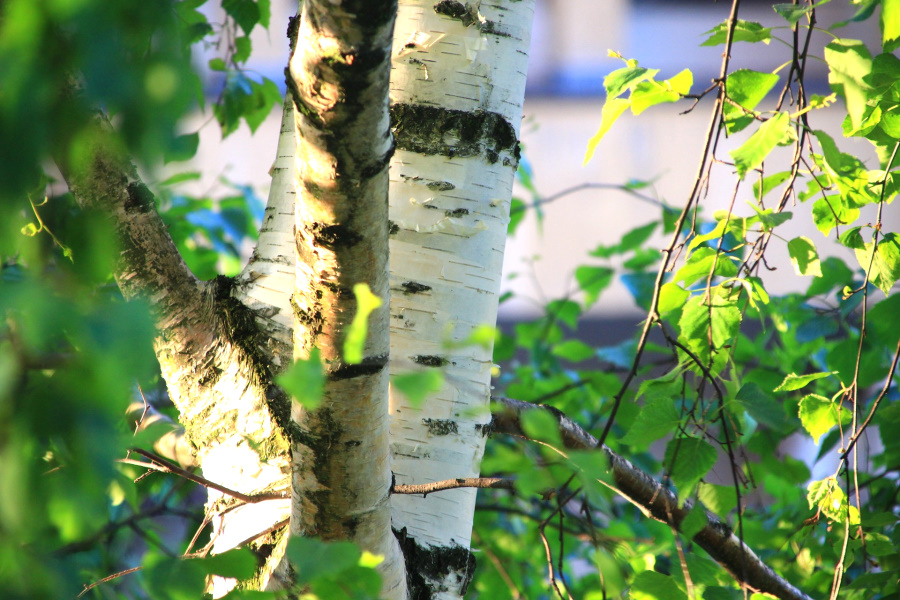
Betulin - a rediscovered gift of nature
It has been known since ancient times that the white part of birch bark has antiseptic properties. Birch bark was applied to the wound for to support faster healing. Tar and activated carbon were also produced from birch. In ancient Russian records, birch is recommended for the treatment of purulent wounds, poorly healing ulcers, while in liquid form poured into purulent wound. “A wreath made of white birch bark removes pain head” it states, inter alia.We can say that there is no other tree in nature, parts of which (bark, leaves, buds, juice, wood and phytopathogenic-parasitic fungus chaga) would be so intensively used in folk medicine. Especially effective were considered bactericidal effects of the white part of birch bark at destruction of pathogens of typhus, tuberculosis and diphtheria.
The substance betulin, which is part of birch bark, has unique therapeutic properties. The white part of the birch bark remains white, even when the tree itself is already rotten. Also this resistance of birch bark to the effect of harmful microflora is attributed to the effect of betulin.
Betulin has been known since the 18th century, when it was chemically defined By German-Russian chemist Johann Tobias Lowitz. Betulin is a pure substance of plant origin, which gives the birch bark its typical white coloring. Protects birches from environmental influences such as extreme temperatures and sunlight and also protects them from attack pests.
Betulin itself has a wide range of uses in the field of dermatology: it has anti-inflammatory effects, relieves itching, promotes cell differentiation skin (keratinocytes), promotes wound healing and is involved in building a protective barrier of the skin. Harmonizes and normalizes the disrupted skin function, helps with atopic dermatitis, psoriasis, contact dermatitis, but also on extremely dry skin.
Betulin powder has been shown to have a positive effect on wound healing and inflammatory diseases. Many pharmaceutical companies give bark extract birch into its products as a tonic and can also be used as skin regenerator. In addition, according to current knowledge, betulin does not induce no allergic reactions, even in people with a birch flower allergy.
From a pharmacological point of view, Betulin, which is long-term subjected research, attribute antiviral, antimicrobial, antioxidant and anti-tumor properties and a positive effect on tissue protection. These properties of the compound (betulin, betulinic acid and their derivatives) are currently being investigated for its expected effect in the treatment of several serious human diseases, including severe herpes, AIDS, hepatitis and some types of cancer.
Basic substances of the white part of birch bark - betulin, lupeol, betulinic acid, affect cancer cells. They are assumed at anticancer effects, triggering apoptosis (death programming cancer cell), for example in alignant melanoma (a malignant disease skin) and other cancers. Cytotoxic effects against some cancer are comparable to some clinically used medicines.
The application of these herbal substances seems to have an important place in treatment and rehabilitation in patients undergoing anti-tumor therapy, whether it is radiotherapy or surgery. The unique biological activity of betulin contributes to the reduction of adverse toxic effects of chemotherapy and radiotherapy on the body, especially on liver.
Betulin contains betulinic acid, which has a broad spectrum biological and pharmacological effects. Betulin derivatives as well as other components of the birch bark are also being tested for the treatment of HIV (virus, which causes AIDS) and other viral respiratory diseases,which can cause severe colds to pneumonia.
Studies carried out in recent decades have shown that betulin also has valuable pharmacological effects: antioxidant,antitumorigenic, hepatoprotective, antiviral, immunomodulatory, antibacterial, regenerative, antipyretic and bile-releasing.
In the white part of the birch bark are found in addition to betulin, acid betulin and b-sitosterol, flavonoids, lupeleol and other valuable substances. Tests at the Russian Institute of Pharmacology have shown that the complex substances, forming the white part of birch bark shows a high antimutagenic activity, thereby reducing the number of mutations in the chromosome and genes and could potentially reduce the frequency of hereditary changes in the body. The antimutagenic effect of the bark substance has a positive effect on the regenerative DNA processes.
Good results have also been obtained with the application of biologically active substances betulin-based food supplements in the prevention and treatment of liver diseases,hepatitis C and tuberculosis. Treatment of liver disease with the support of Betulin aims in particular at protecting liver cells from various chemical damage substances.
The substances that make up betulin have high hepatoprotective and detoxifying properties properties. Betulin normalizes bile secretion, reduces levels of blood cholesterol. The antioxidant activities of betulin cause decomposition of organic peroxides, especially the lipid peroxides - they play crucial role in disrupting the normal structure of biological membranes. Therefore, they also have a positive effect on the enzymes of antioxidant protection of cells.
Research shows that in regions where they traditionally use bark products birch as a medicine but also as useful household items, for example like food boxes, people live longer and have been recorded as well lower incidence of oncological diseases. Natural product Betulin and its positive effects on several diseases we also discover, together with promoting modern scientific methods, to enable to use them in active prevention and treatment.
Supplier
BETULÍN PHARMA Ltd.Hurbanova 651/64
Hlohovec 920 01
Slovak Republic




 E-SHOP
E-SHOP

